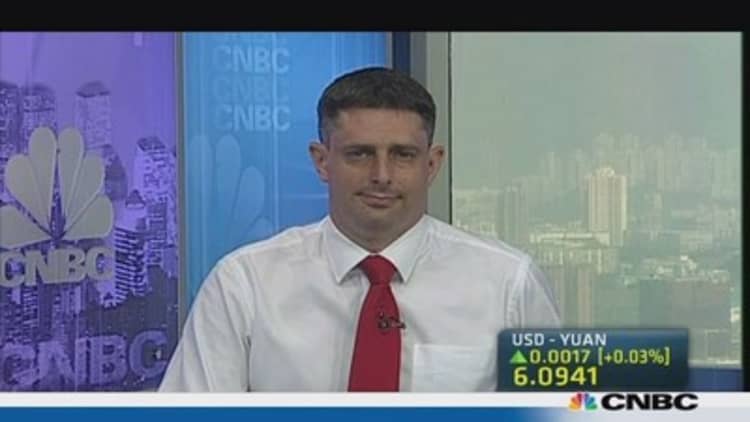Chinese home prices' ninth straight month of increases may make for shocking headlines, but analysts don't expect fresh property sector curbs anytime soon.
Average home prices in 70 major cities rose 9.1 percent on year in September, according to Reuters calculations based on official data, faster than August's 8.3 percent rise, marking a ninth straight month of year-on-year advances, but month-on-month, prices were up 0.7 percent, a tad below August's 0.8 percent increase.
While the year-on-year figures look high, "most of the growth actually occurred in February and March," before property cooling measures were introduced, noted James MacDonald, head of China research at Savills. "While it's high year-on-year, month-on-month is lower than the beginning of the year."
(Read more: Fear of missing out fuels China property market)
He does not expect any new cooling measures in the near term, although the upcoming plenary in November may bring some reform efforts. China's Communist Party leaders will hold the third Plenary Session in November to set the country's economic agenda.
"This is a good period of time for longer-term policy regulations to steer property in a healthier direction," he said. He expects announcements on property taxes, land supply reform and possibly different approaches on financing.
Others note the average price rise doesn't tell the whole story.
(Read more: China property immune to tapering: China's richest man)

"The problem that China's policy makers have now is that the market has split itself into two. These price rises are being seen in tier one (and) tier two cities where land is now scarce and as we see a policy easing in the second half, we see property prices in these cities going up. But we have oversupply in the tier three and below cities, particularly in Central and Western China.," Erwin Sanft, head of China equity research at Standard Chartered, told CNBC.
Home prices in Shanghai and Beijing rose 16-17 percent on year in September. Sanft noted these cities' property markets are "quite mature," with limited new plots available for development.
(Read more: Asia's commercial property deals set for record year)
"We have these headlines which look like a challenge. But the real challenge is what to do with all of the oversupply of property in tier three and below cities. I think the policy will remain fairly hands off for the time being," he added.
"The reality is the softness in the first half was probably more severe than the headline growth numbers suggested and there's not a lot of appetite for more tightening," Sanft said. He expects the main signal for more tightening efforts will come from inflation data.
(Read more: Property database delay frustrates China's anti-graft drive)
"To the extent that these property prices are a lead indicator of more general inflation, then we'll have tightening, but that's not feeding through immediately," he said. He expects credit tightening measures may emerge in the middle of next year, and those will likely put pressure on the property market.
"Looking 10 months out and beyond, it's hard to see it keep going up," he said, noting demographic trends in China, including an aging population and the likelihood families will remain small, aren't supportive of an "ever-rising" environment.
— By CNBC's Leslie Shaffer. Follow her on Twitter: @LeslieShaffer1

